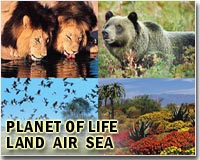 |
Nagoya, Japan (AFP) Oct 30, 2010 A historic global treaty to protect the world's forests, coral reefs and other threatened ecosystems within 10 years was sealed at a UN summit on Saturday. Rich and poor nations agreed to take "effective and urgent" action to curb the destruction of nature in an effort to halt the loss of the world's biodiversity on which human survival depends. Delegates from 193 countries committed to key goals by 2020 such as curbing pollution, protecting forests and coral reefs, setting aside areas of land and water for conservation, and managing fisheries sustainably. "This is a day to celebrate," UN Environment Programme chief Achim Steiner said straight after the accord was struck early on Saturday morning following nearly two weeks of tense talks in the central Japanese city of Nagoya. Delegates and green groups also said the accord offered hope that the United Nations could help to solve the planet's many environmental problems, particularly after the failure of climate change talks in Copenhagen last year. One of the most significant elements of the accord was a commitment to protect 17 percent of land and 10 percent of oceans so that biodiversity there could thrive. Currently only 13 percent of land and one percent of oceans are protected. Nevertheless, Greenpeace expressed disappointment at the new targets, which delegates said were lowered on the insistence of China and some other developing countries. Greenpeace had been pushing for 20 percent of oceans to be conserved, as a step towards an eventual target of 40-percent preservation. There were other limitations to the Nagoya pact -- including that the United States was not a signatory as it is one of the few countries not to have ratified the UN's Convention on Biological Diversity (CBD). But while some green groups said the 20-point plan was not as ambitious as hoped, most still welcomed it as a historic step towards united global action in tackling biodiversity problems and raising awareness about the issue. "Governments have sent a strong message that protecting the health of the planet has a place in international politics and countries are ready to join forces to save life on Earth," WWF International director general Jim Leape said. Conservation International president Russ Mittermeier was even more upbeat, saying: "This conference must be viewed as a success and a major global achievement." The accord was clinched after a last-minute breakthrough on an 18-year stand-off over "fairly" sharing the benefits and knowledge of genetic resource riches that are found mostly in developing countries. Brazil, home to much of the Amazon basin and its global treasure trove of resources, had insisted throughout the summit that it would not agree to the 20-point strategic plan unless there was also a deal on genetic riches. Brazil and other developing countries argued powerful nations and companies should not be allowed to freely take genetic resources such as wild plants to make medicines, cosmetics and other products for huge profits. They had been battling developed countries -- where most of the drug and other companies that enjoy the benefits of genetic resources are based -- over the issue since the CBD was formed at the Rio de Janeiro Earth Summit in 1992. The European Union led developed nations in finally agreeing to the so-called Access and Benefits Sharing Protocol to ensure success on the 20-point strategic plan. The legally binding protocol will ensure countries with genetic resources enjoy some of the profits of the assets' commercial development. However many details of the protocol, such as how much this may cost pharmaceutical companies and developed nations, were left for later negotiations. UN chiefs told the opening of the summit that forging a global consensus on protecting nature was vital to stop the mass extinction of animals and plant species. Nearly a quarter of mammals, one-third of amphibians and more than a fifth of plant species now face the threat of extinction, according to the International Union for Conservation of Nature. Pressure will only grow with the world's human population expected to rise from 6.8 billion to nine billion by 2050.
Share This Article With Planet Earth
Related Links Darwin Today At TerraDaily.com
 World Bank calls for ecosystems to be valued
World Bank calls for ecosystems to be valuedNagoya, Japan (AFP) Oct 28, 2010 The World Bank on Thursday called for a radical shift in countries' economic models to include the values of forests, mangroves, coral reefs and other ecosystems. India and Colombia will be among the first countries to take part in a five-year pilot programme with the World Bank to start the economic revolution. World Bank president Robert Zoellick announced the programme on the sideline ... read more |
|
| The content herein, unless otherwise known to be public domain, are Copyright 1995-2010 - SpaceDaily. AFP and UPI Wire Stories are copyright Agence France-Presse and United Press International. ESA Portal Reports are copyright European Space Agency. All NASA sourced material is public domain. Additional copyrights may apply in whole or part to other bona fide parties. Advertising does not imply endorsement,agreement or approval of any opinions, statements or information provided by SpaceDaily on any Web page published or hosted by SpaceDaily. Privacy Statement |